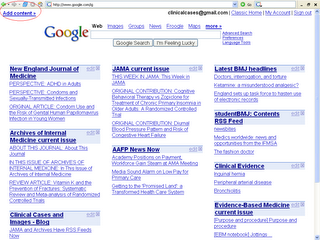 Editorial: Meat Consumption and Cancer Risk.
Editorial: Meat Consumption and Cancer Risk.Jeanine M. Genkinger, Anita Koushik. PLoS Medicine, 12/2007.
According to A Prospective Study of Red and Processed Meat Intake in Relation to Cancer Risk, elevated risks (20-60%) were evident for esophageal, colorectal, liver, and lung cancer, comparing individuals in the highest with those in the lowest quintile of red meat intake. Individuals in the highest quintile of processed meat intake had a 20% elevated risk for colorectal and a 16% elevated risk for lung cancer. In conclusion, both red and processed meat intakes were associated with increased risk of cancers of the colorectum and lung. Red meat intake was associated with an elevated risk for cancers of the esophagus and liver.
Systematic Review: Comparative Effectiveness of Treatments to Prevent Fractures in Men and Women with Low Bone Density or Osteoporosis.
Catherine MacLean et al. Annals of Int Medicine, 01/2008.
Authors conclude that good evidence suggests that bisphosphonates, estrogen, parathyroid hormone, and raloxifene prevent vertebral fractures more than placebo; evidence for calcitonin was fair. Good evidence suggests that bisphosponates prevent hip fractures more than placebo. The effects of vitamin D varied with dose. Raloxifene, estrogen, and estrogen–progestin increased the risk for thromboembolic events.
Systematic Review: Comparative Effectiveness of Angiotensin-Converting Enzyme Inhibitors and Angiotensin II Receptor Blockers for Treating Essential Hypertension.
David B. Matchar et al. Annals of Int Medicine, 01/2008.
Which class is better -- ACEi or ARB? According to this meta-analysis, ACE inhibitors and ARBs had similar long-term effects on blood pressure. No consistent differential effects were observed for other outcomes (infrequently studied over the long term), including death, cardiovascular events, lipid levels, progression to diabetes, left ventricular function, and kidney disease. may have a slight edge because ACE inhibitors were associated with a greater risk for cough. Fewer withdrawals due to adverse events and greater persistence with therapy tended to favor ARBs over ACE inhibitors.
Related editorial: Inhibitors of the Renin–Angiotensin System: Proven Benefits, Unproven Safety. Patrick S. Parfrey.
Meta-analysis: Effect of Monotherapy and Combination Therapy with Inhibitors of the Renin–Angiotensin System on Proteinuria in Renal Disease.
Regina Kunz et al. Annals of Int Medicine, 01/2008.
ARBs reduce proteinuria to a similar degree as ACE inhibitors. The combination of the 2 drugs (ACEi + ARB) seems to reduce proteinuria more than either drug alone.
Achieving a High-Performance Health Care System with Universal Access: What the United States Can Learn from Other Countries.
American College of Physicians, Annals of Int Medicine, 01/2008.
One Step Forward, Two Steps Back — Will There Ever Be an AIDS Vaccine?
Robert Steinbrook, M.D. NEJM, 12/2007.
Related article: Antibody-Based HIV-1 Vaccines: Recent Developments and Future Directions. PLoS Medicine, 12/2007.
The Challenges of Chagas Disease— Grim Outlook or Glimmer of Hope. Rick L. Tarleton, Richard Reithinger, Julio A. Urbina, Uriel Kitron, Ricardo E. Gürtler. PLoS Medicine, 12/2007. -- Chagas disease spreads in a particularly "disgusting" way: by kissing bugs that bite people's faces at night http://buff.ly/1pcdA2Z
A time efficient way to stay up-to-date with medical literature
"How do you eat in elephant? In small bites." The same rule probably applies to staying current with the ever expanding avalanche of medical literature. One can try the following approach:
1. Subscribe the to the RSS feeds of the 5 major medical journals (NEJM, JAMA, BMJ, Lancet and Annals) plus 2-3 subpecialty journals in your field of interest.

Medical Journals tab: A screenshot of iGoogle with RSS feeds from the major medical journals.
2. Read the journal on the day it is published online, for example, NEJM on Wednesdays.
3. Use text-to-speech to listen to articles you do not have time to read.
4. Listen to journal podcasts. Click here to subscribe the podcasts of the 4 major journals in iGoogle.
Related:
Make Your Own "Medical Journal" with iGoogle Personalized Page
Share iGoogle Tabs with Medical Journals, Podcasts and Gadgets
Annals of Internal Medicine Launches Podcast and Audio Summaries
Text-to-Speech Programs and Continuous Medical Education
Updated: 01/12/2008